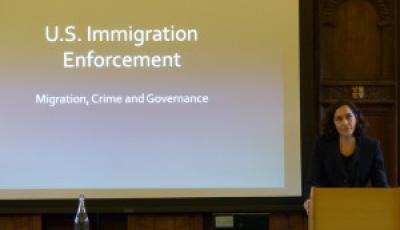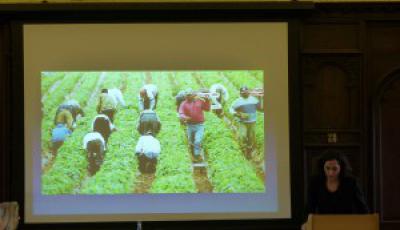Trajectories of Immigration Enforcement and the Criminal Justice System: The Costs and Benefits of Inequality
Posted:
Time to read:
Post by Alice Gerlach, DPhil Candidate, Centre for Criminology, University of Oxford. This post was originally published on the Centre for Criminology's blog on 19 November 2014.
On 12 November 2014, Professor Jennifer Chacón spoke at All Soul’s College in Oxford on the topic of ‘Immigration Enforcement and the Criminal Justice System in the United States.’ Chacón’s seminar was a comparison of the trajectories of immigration enforcement and criminal justice in the US, arguing the punitiveness of both in recent years have shifted in opposite directions, but that both moves have resulted in poor outcomes for vulnerable groups.

On the surface these shifts in punitiveness are polar opposites, however, Chacón argued both are on the same trajectory. In an age of austerity measures, and in a country where popular perception sees migrants as a threat to fiscal stability, the prosecution of migrants is a cheap fix to the ‘siege’ from across the border. The vulnerability of migrants is ignored and prosecuted individuals are inevitably deported becoming an expense for their home nations instead of the US. With all these deportations, naturally the immigration enforcement sector is booming, creating jobs and wealth for the middle classes. For example, in recent years the number of border agents have increased from five to twenty thousand individuals―this is despite border apprehensions dipping to a historical low in the same period.

The trajectories highlighted here by Chacón are worrying, and I can’t help but compare them with those of immigration enforcement and the criminal justice system in the UK. I can’t say the criminal justice system here is moving towards decriminalisation with prison occupancy at record levels, however, the outsourcing of prison services, tagging and probation services to private companies is the same. Undoubtedly this outsourcing creates wealth for some in the name of austerity and at the cost of services for a marginalised and vulnerable population. The rise in self-inflicted prisoner deaths linked to budget cuts and staff shortages is a particularly poignant example of this. Immigration enforcement draws a closer parallel, with a steady increase in criminalisation in recent years, and with the same private, for profit, companies involved in the criminal justice system running immigration removal centres, and providing security during enforced removals. Here again a vulnerable population is at risk, with protections such as legal aid no longer available due to austerity measures and serious questions being raised regarding the standard of care provided to individuals in detention.

Any thoughts on this post? Get in touch with us! Send us an email, or post a comment here or on Facebook. You can also tweet us.
__________
How to cite this blog post (Harvard style):
Gerlach A (2014) Trajectories of Immigration Enforcement and the Criminal Justice System: The Costs and Benefits of Inequality. Available at: http://bordercriminologies.law.ox.ac.uk/trajectories-of-immigration-enforcement/ (Accessed [date]).
Share:








